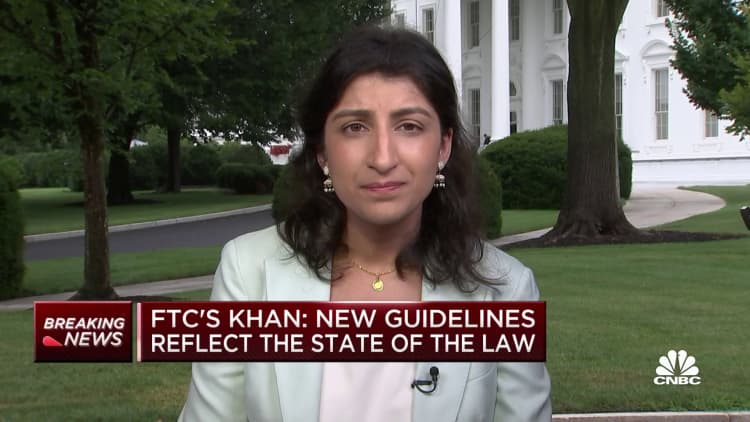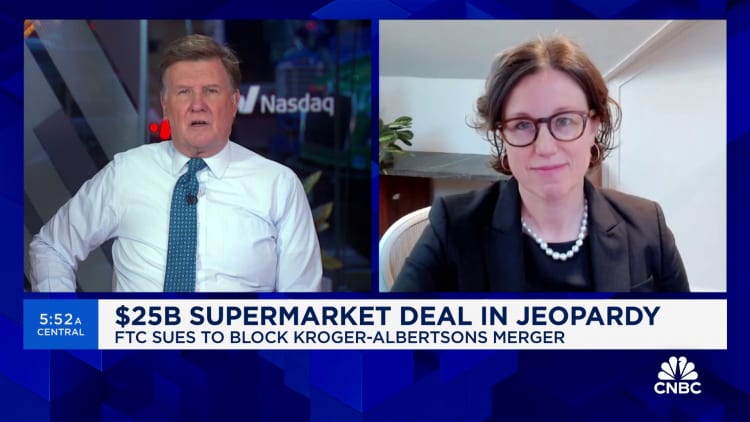With regulators exerting more scrutiny on mergers and acquisitions, managing risk is increasingly important for companies planning nuptials.
One time-honored corporate M&A prenup strategy, which could become more important going forward, is the use of break-up fees, also known as termination fees. These fees — paid by the buyer, seller, or both — help compensate either party for a soured deal. Merger agreements spell out when these fees are payable, by whom, and under what circumstances.
When deals fall apart for regulatory reasons, buyers are often on the hook to pay what's known as a reverse termination fee, designed to help reimburse the seller for expenses and other risks related to a failed deal. These fees have been rising in recent years as a percentage of deal value, in part due to a more hostile regulatory environment.
"Even companies that are relatively confident about getting their deal cleared, are making provisions for risk that they don't," said Jeane A. Thomas, a partner with Crowell & Moring who handles antitrust matters. In addition to reverse termination fees, companies are also allowing for longer timelines and more extensions than they were a few years ago, Thomas said.
Not all deals include break-up fees for regulatory failures. Capital One's $35.3 billion all-stock deal for Discover Financial Services, for instance, has a $1.38 billion break-up fee, payable by either party under certain circumstances "involving alternative acquisition proposals or changes in the recommendation of the other party's board of directors," according to a regulatory filing. But the agreement leaves out payment for regulatory barriers.
Meanwhile, Visa's deal for Plaid was scuttled in 2021 due to regulatory snares, with neither of the companies owing break-up fees.
In recent years, these fees have been featured on over half of deals. A 2022 study by investment bank Houlihan Lokey shows that 57.1% of the 140 transactions reviewed had reverse breakup fees, with median fees of 4.2% as a percentage of transaction value. That compares with 58.1% of the 179 transactions reviewed in 2021, which had median fees of 3.7% as a percentage of transaction value.
A changed calculus on 'anticompetitive'
Regulators have bumped up their review of mergers in technology, pharmaceuticals, banking, energy and other sectors, meaning there's more chance of a deal getting scuttled. What's more, the Federal Trade Commission and Department of Justice's antitrust division released a draft of merger guidelines last summer with 13 points for the agencies to use when evaluating mergers. This means that the regulators effectively put up an additional roadblock for greenlighting deals.
"Perhaps most notably, the new guidelines lower thresholds at which mergers would be deemed presumptively anticompetitive," Pitchbook stated in a report.

Industry participants said they expect the harsher regulatory regime to remain intact, at least until after the election — and longer — if President Biden remains in office. "We're in a particularly hostile environment for deal-making when you are pursuing companies in your own industry," said Laura Born, adjunct professor of finance at University of Chicago Booth School of Business. "It's all about the politics and the inability to get the deals across the finish line."
And it's not just U.S. regulators taking a hard stance. "Sometimes one regulator will give a thumb's up and regulators in another part of the world give the thumbs down," said Tom Barkley, a professor of finance practice at the Martin J. Whitman School of Management at Syracuse University.
For some sellers, there are multiple reasons to be cautious in this regulatory environment, and ask for a higher break-up fee as protection. "If you're representing the seller, I think you have a good argument to say, 'We can't assume anything here and therefore we want a reverse termination fee,'" said Corey Roush, partner at Akin Gump Strauss Hauer & Feld, who co-leads the firm's antitrust practice.
Certainly, it's a negotiation tactic that many sellers will want to seek in their agreements, and some buyers may be more willing to consider such a fee than they were a few years back. Roush knows of buyers who previously refused to entertain a reverse termination fee, but are now more willing to negotiate something small. "Buyers are concerned that the seller might be willing to take a lower bid for more deal certainty," Roush said.
Prenup costs among the market's biggest companies
Notably, reverse termination fees as a percentage of deal value for deals that failed to pass regulatory muster have been in the range of around 1.5% to more than 6.5% in the past few years, according to M&A data provider Mergermarket.
A number of large companies have paid reverse termination fees in recent years after running into regulatory roadblocks. Amazon, for example, recently ended its bid to acquire robotic vacuum-maker iRobot, paying a $94 million break-up fee, representing 6.71% of deal value, according to Mergermarket data. Adobe called off its deal with Figma and paid the company a $1 billion break-up fee, 5% of the deal, Mergermarket data show. Meanwhile, Kroger's $24.6 billion acquisition of Albertsons, which has come under regulatory scrutiny, carries a $600 million reverse break-up fee if the deal fails.
Despite the Capital One-Discover Financial and Visa-Plaid examples, it's unlikely for most sellers to agree to forgo these fees, experts say, especially given the uncertain regulatory climate. At the very least, it would be appropriate for a seller to ask for a small expense reimbursement for cost and time, especially as deals tend to drag on longer due to regulatory scrutiny, said Chip MacDonald, a financial services attorney with MacDonald Partners.
He offers the example of TD's $225 million payment to First Horizon after their $13.4 billion deal flopped for regulatory reasons. "An expense reimbursement, at a minimum, is appropriate," MacDonald said.
There's no one, good way to break up
Certainly, there's a chance that some future sellers may be willing to forgo reverse termination fees.
It's very deal-specific, but it's possible the deal could be so good — or the parties are so convinced the deal will go through — they don't feel they need the added protection, MacDonald said.
Some sellers might be willing to accept a slightly higher price in exchange for no reverse termination fee, Barkley said. Maybe a buyer would offer $35.3 billion instead of $35 billion. It's still a risk for a seller, but one some companies might be willing to take, he said.
In some cases, not having a reverse termination fee could speak to the parties' respective negotiating power. For instance, the seller might not be in a position to argue for a reverse termination fee, if, for example, it has a major compliance issue. A buyer is unlikely to agree to a reverse termination fee if there are formal actions against a seller that could hold up the deal, MacDonald said.
What's certain is that both buyers and sellers need to prepare for a regulatory world in which the deal-making odds are more unpredictable.
"Even putting your best foot forward may not get a transaction through," said Drew Pascarella, senior lecturer of finance at the SC Johnson Graduate School of Management at Cornell University. "In that way it's totally out of the control of the buyer and seller, and that might lead to more merger agreements having a carve-out for termination fees for lack of regulatory approval," he said.







